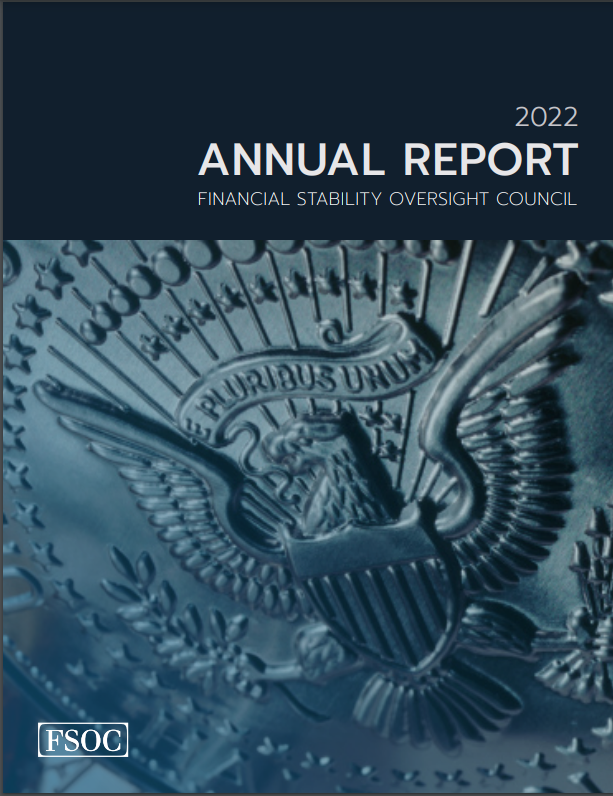Newsroom
FSOC report flags digital assets, climate risk, cybersecurity
 The Financial Stability Oversight Council (FSOC) released its annual report Friday, noting that, “amid heightened geopolitical and economic shocks and inflation, risks to the U.S. economy and financial stability have increased even as the financial system has exhibited resilience.” The report includes details on risks related to digital assets, climate, cybersecurity, and more, and recommendations to mitigate them.
The Financial Stability Oversight Council (FSOC) released its annual report Friday, noting that, “amid heightened geopolitical and economic shocks and inflation, risks to the U.S. economy and financial stability have increased even as the financial system has exhibited resilience.” The report includes details on risks related to digital assets, climate, cybersecurity, and more, and recommendations to mitigate them.
On digital assets, FSOC reported that these assets currently have limited impact on the broader U.S. financial system, but that their interconnectedness with traditional financial institutions could increase rapidly.
To guard against risks that could have a significant impact, the council recommended Congress give federal financial regulators rulemaking authority for digital assets that are not securities, as well as enact legislation to prevent digital-assets-related regulatory arbitrage. Regulatory and legislative efforts on this front could impact credit unions’ ability to engage in digital asset activity and their relationships with third-party digital asset service providers.
NAFCU has called on lawmakers and regulators to ensure a level playing field and appropriate cybersecurity regulations within the financial services industry. However, the association has also fought against efforts to extend the NCUA’s authority to third-party vendors due to the extreme costs and regulatory burdens it would put on credit unions.
Additionally, the council gave support for actions to improve the availability of data for assessing climate-related financial risks and called on state and federal agencies coordinate on ways to identify, prioritize, and procure the necessary data – NAFCU has previously encouraged FSOC members to coordinate on climate risk policies. While recommending appropriately tailored supervisory expectations of risk management practices, the council highlighted the need for financial regulators to continue to promote consistent, comparable, and decision-useful disclosures that allow investors and financial institutions to consider climate-related financial risks in their investment and lending decisions.
Cybersecurity vulnerability and resilience remain priorities within the financial services system. The council touted partnerships between state and federal agencies and the strides made over the past year to manage and track cyber risk. NAFCU continues to advocate for a national data security standard that establishes robust data privacy and data security standards for all entities that collect and use consumers’ financial information.
In addition, the council gave recommendations for financial institutions to prepare for the end of LIBOR; the Federal Reserve Board Friday adopted a final rule selecting SOFR as the replacement benchmark rate.
Share This
Related Resources
Add to Calendar 2024-06-26 14:00:00 2024-06-26 14:00:00 Gallagher Executive Compensation and Benefits Survey About the Webinar The webinar will share trends in executive pay increases, annual bonuses, and nonqualified benefit plans. Learn how to use the data charts as well as make this data actionable in order to improve your retention strategy. You’ll hear directly from the survey project manager on how to maximize the data points to gain a competitive edge in the market. Key findings on: Total compensation by asset size Nonqualified benefit plans Bonus targets and metrics Prerequisites Demographics Board expenses Watch On-Demand Web NAFCU digital@nafcu.org America/New_York public
Gallagher Executive Compensation and Benefits Survey
preferred partner
Gallagher
Webinar
Add to Calendar 2024-06-21 09:00:00 2024-06-21 09:00:00 The Evolving Role of the CISO in Credit Unions Listen On: Key Takeaways: [01:30] Being able to properly implement risk management decisions, especially in the cyber age we live in, is incredibly important so CISOs have a lot of challenges here. [02:27] Having a leader who can really communicate cyber risks and understand how ready that institution is to deal with cyber events is incredibly important. [05:36] We need to be talking about risk openly. We need to be documenting and really understanding what remediating risk looks like and how you do that strategically. [16:38] Governance, risk, compliance, and adherence to regulatory controls are all being looked at much more closely. You are also seeing other technology that is coming into the fold directly responsible for helping CISOs navigate those waters. [18:28] The reaction from the governing bodies is directly related to the needs of the position. They’re trying to help make sure that we are positioned in a way that gets us the most possibility of success, maturing our postures and protecting the institutions. Web NAFCU digital@nafcu.org America/New_York public
The Evolving Role of the CISO in Credit Unions
preferred partner
DefenseStorm
Podcast
AI in Action: Redefining Disaster Preparedness and Financial Security
Strategy
preferred partner
Allied Solutions
Blog Post
Get daily updates.
Subscribe to NAFCU today.
